|
|
|
Sort Order |
|
|
|
Items / Page
|
|
|
|
|
|
|
| Srl | Item |
| 1 |
ID:
113340
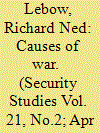

|
|
|
| 2 |
ID:
154681
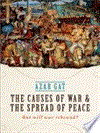

|
|
|
|
|
| Publication |
Oxford, Oxford University Press, 2017.
|
| Description |
xiv, 303p.: ill., diagrams, maps, tableshbk
|
| Standard Number |
9780198795025
|
|
|
|
|
|
|
|
|
|
|
|
Copies: C:1/I:0,R:0,Q:0
Circulation
| Accession# | Call# | Current Location | Status | Policy | Location |
| 059150 | 355.027/GAT 059150 | Main | On Shelf | General | |
|
|
|
|
| 3 |
ID:
186191
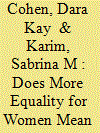

|
|
|
|
|
| Summary/Abstract |
Recent world events, such as the rise of hypermasculine authoritarian leaders, have shown the importance of both sex and gender for understanding international politics. However, quantitative researchers of conflict have long relegated the study of sex and gender inequality as a cause of war to a specialized group of scholars, despite overwhelming evidence that the connections are profound and consequential. In this review essay, we demonstrate the tremendous progress made in this field by analyzing a wave of research that examines the relationships between sex and gender inequality and war. We divide this work into theories that emphasize strategy versus those that analyze structures. In addition, we focus on two aspects of this research agenda—specifying mechanisms that link sex and gender inequality to war, and leveraging data at multiple levels of analysis—to outline fruitful pathways forward for the broader international security research agenda. Ultimately, we argue that the study of the nexus of sex and gender inequality and war will enliven theoretical debates, illuminate new hypotheses, and enrich the policy discourse with robust evidence.
|
|
|
|
|
|
|
|
|
|
|
|
|
|
|
|
| 4 |
ID:
080681
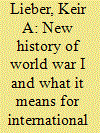

|
|
|
|
|
| Publication |
2007.
|
| Summary/Abstract |
World War I looms large in international relations theory. The core concepts of defensive realism-the security dilemma, spiral model, and offense-defense balance-were largely inspired by this single historical case, and evidence from the war is frequently used to test explanations built on those concepts. The new historiography of World War I, however, challenges many of the long-held assumptions about the origins of the conflict. Newly available evidence strongly suggests that German leaders went to war in 1914 with eyes wide open. They provoked a war to achieve their goal of dominating the European continent, and did so aware that the coming conflict would almost certainly be long and bloody. Germany's leaders did not go to war with a bold operational blueprint for quick victory embodied in the Schlieffen Plan; they did not misjudge the nature of modern war; and they did not lose control of events on the eve of the conflict and attack out of fear that Germany's enemies would move first. In light of the new history, international relations scholars should reexamine their empirical understandings of this conflict, as well as their theoretical presuppositions about the causes of war.
|
|
|
|
|
|
|
|
|
|
|
|
|
|
|
|
| 5 |
ID:
161358
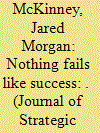

|
|
|
|
|
| Summary/Abstract |
During the July Crisis Britain’s foreign secretary, Sir Edward Grey, focused on organising a conference through which differences could be reconciled. After the war, he maintained that Germany’s unwillingness to join this conference was one of the immediate causes of war. This essay disputes Grey’s contention, arguing that his plans for a conference, based on a misleading analogy to the previous Balkan Crises, actually helped facilitate the outbreak of war in 1914 by sanctioning inaction in the first phase of the crisis (28 June–22 July) and by tacitly encouraging Russian mobilisation in the second phase (23 July–4 August).
|
|
|
|
|
|
|
|
|
|
|
|
|
|
|
|
| 6 |
ID:
123167
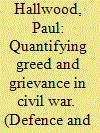

|
|
|
|
|
| Publication |
2013.
|
| Summary/Abstract |
Greed' vs. 'grievance' is weighed using a generally applicable methodology as motivations in the American War of Independence. Greed is quantified as the expected economic benefit of Independence - escaping colonial trade burdens and expected increased economic growth rates. Grievance is measured as willingness to pay to escape perceived political burdens. Quantification of the relative contributions is made possible by using estimates of expected war-costs. To the extent that the economic burden was insufficient to explain the War, the residual is ascribed to the grievance motivation. Both motives are shown to have contributed to the War, but grievance dominates.
|
|
|
|
|
|
|
|
|
|
|
|
|
|
|
|
| 7 |
ID:
046579
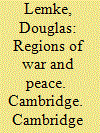

|
|
|
|
|
| Publication |
Cambridge, Cambridge University Press, 2002.
|
| Description |
xii, 235p.
|
| Standard Number |
0521007720
|
|
|
|
|
|
|
|
|
|
|
|
Copies: C:1/I:0,R:0,Q:0
Circulation
| Accession# | Call# | Current Location | Status | Policy | Location |
| 045456 | 327.172/LEM 045456 | Main | On Shelf | General | |
|
|
|
|
| 8 |
ID:
132919
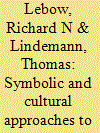

|
|
|
|
|
| Publication |
2014.
|
| Summary/Abstract |
This forum offers a symbolic and cultural approach for understanding the outbreak of World War I that stresses the interactional and symbolic-cultural aspects of German decision makers' brinkmanship during the July crisis of 1914. Contrary to excessive structuralist accounts, the contributions focus on what actors 'do' and 'feel' during a crisis. In the German-Austrian case, symbolic interactions during the July crisis were strongly marked by challenges to the 'face' of decision makers. The second theme of the Forum is to question the purely 'material' nature of those structures traditionally referred to as permissive for World War I. Structures, in fact, are symbolic, too. Like theories on status discrepancy, the Forum stresses the impact of 'responsibility gaps'. However, the contributors also point to the emotional aspects and internal legitimacy problems caused precisely by those status lags.
|
|
|
|
|
|
|
|
|
|
|
|
|
|
|
|
| 9 |
ID:
090150
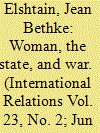

|
|
|
|
|
| Publication |
2009.
|
| Summary/Abstract |
Does `gender' as a category of analysis or as a central feature of a logic of explanation alter in significant ways Kenneth Waltz's famous `levels of analysis' as developed in his classic, Man, the State, and War? One overriding claim of feminist international relations has been that `gender' alters all levels of analysis; thus, changing `man' to `woman' in the formulation `man, the state, and war' significantly transforms our understanding of international relations. I evaluate this claim critically by assessing the adequacy of feminist formulations on each of Waltz's levels of analysis and, further, by unpacking Waltz's own understanding of these levels. I conclude that Waltz remains enormously helpful in deconstructing reductionist accounts, especially on the `first level' of analysis, but that his own account is problematic insofar as it insists on a `structural analysis' sundered from his levels 1 and 2, namely, wars flow from human nature or, alternatively, from the domestic ordering of states. I point out that Waltz himself leaves some `wiggle room' in his book that permits one to `plug in' features of the first two levels of analysis that are critical to understanding the structural level. In other words, all three levels must be in play if one is to craft a compelling explanatory framework.
|
|
|
|
|
|
|
|
|
|
|
|
|
|
|
|
|
|
|
|
|